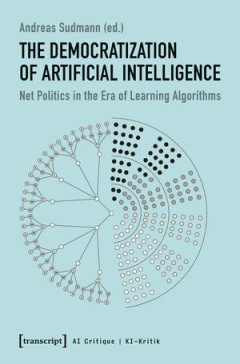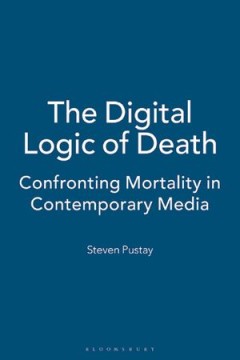Filter by

Freedom of the Press On Censorship, Self-censorship, and Press Ethics
Since antiquity it has been known that without the freedom to speak, and later to publish, the road to fanaticism and totalitarianism lies wide open. This book focuses on how the 'press' reacted, when press freedom was under strain in number of cases in the 20th century and the beginning of the 21st century. Contemporary literature on the freedom of the press has its focus on the role of the pr…
- Edition
- -
- ISBN/ISSN
- 9783832951849
- Collation
- -
- Series Title
- -
- Call Number
- -

The Democratization of Artificial Intelligence Net Politics in the Era of Le…
After a long time of neglect, Artificial Intelligence is once again at the center of most of our political, economic, and socio-cultural debates. Recent advances in the field of Artifical Neural Networks have led to a renaissance of dystopian and utopian speculations on an AI-rendered future. Algorithmic technologies are deployed for identifying potential terrorists through vast surveillance ne…
- Edition
- -
- ISBN/ISSN
- 9783837647198, 9783839447192
- Collation
- -
- Series Title
- -
- Call Number
- -

Between Violence, Vulnerability, Resilience and Resistance: Arab Television N…
How are the structures of power and the notion of agency among Syrian women during the recent Syrian conflict connected? To explore this matter, Rand El Zein investigates gender politics around displacement, conflict, the body, and the nation. In doing so, she outstandingly reconciles critical media theory as myriad and productive with the theoretical concepts on subjectivity, power, performati…
- Edition
- -
- ISBN/ISSN
- 9783839459591
- Collation
- -
- Series Title
- -
- Call Number
- 791.45 ZEI b

Battlefields of Negotiation
The massively multiplayer online role-playing game World of Warcraft has become one of the most popular computer games of the past decade, introducing millions around the world to community-based play. Within the boundaries set by its design, the game encourages players to appropriate and shape the game to their own wishes, resulting in highly diverse forms of play and participation. This illum…
- Edition
- -
- ISBN/ISSN
- 9789089645005
- Collation
- -
- Series Title
- -
- Call Number
- 791 GLA g

The New Woman International: Representations in Photography and Film from the…
Images of flappers, garçonnes, Modern Girls, neue Frauen, and trampky—all embodiments of the dashing New Woman—symbolized an expanded public role for women from the suffragist era through the dawn of 1960s feminism. Chronicling nearly a century of global challenges to gender norms, The New Woman International: Representations in Photography and Film from the 1870s through the 1960s is the …
- Edition
- -
- ISBN/ISSN
- 9780472900367
- Collation
- -
- Series Title
- -
- Call Number
- 791.43 NEW n

Performing Hysteria: Images and Imaginations of Hysteria
Cross-disciplinary analysis of contemporary images and representations of hysteria We seem to be living in hysterical times. A simple Google search reveals the sheer bottomless well of “hysterical” discussions on diverse topics such as the #metoo movement, Trumpianism, border wars, Brexit, transgender liberation, Black Lives Matter, COVID-19, and climate change, to name only a few. Against…
- Edition
- -
- ISBN/ISSN
- 9789461663139
- Collation
- -
- Series Title
- -
- Call Number
- 792 PER p

Tactics of the Human: Experimental Technics in American Fiction
Tactics of the Human returns to American fiction published during the 1990s, formative years for digital cultures, to reconsider these narratives’ comparative literary print methods of critically engaging with digital technologies and their now ubiquitous computation-based modes of circulation, scenes of writing, and social spaces. It finds that fiction by John Barth, Shelley Jackson, Leslie …
- Edition
- -
- ISBN/ISSN
- 9780472900169
- Collation
- -
- Series Title
- -
- Call Number
- 300

Ink-Stained Hollywood: The Triumph of American Cinema’s Trade Press
For the first half of the twentieth century, no American industry boasted a more motley and prolific trade press than the movie business—a cutthroat landscape that set the stage for battle by ink. In 1930, Martin Quigley, publisher of Exhibitors Herald, conspired with Hollywood studios to eliminate all competing trade papers, yet this attempt and each one thereafter collapsed. Exploring the c…
- Edition
- -
- ISBN/ISSN
- 9780520383708
- Collation
- -
- Series Title
- -
- Call Number
- 777 HOY i

Frame by Frame
For most of the twentieth century, the making of animated cartoons was mechanized and standardized to allow for high-volume production: thousands of drawings were inked and painted onto individual transparent celluloid sheets (called "cels") and then photographed in succession, a labor-intensive process that was divided across scores of artists and technicians, most of them anonymous. In order …
- Edition
- -
- ISBN/ISSN
- 9780520972773
- Collation
- -
- Series Title
- -
- Call Number
- 791.43 FRA f

The Digital Logic of Death: Confronting Mortality in Contemporary Media
In The Digital Logic of Death, Steven Pustay skillfully makes visible the immensely important but often overlooked role that moving images play in shaping our understanding of mortality. This relationship, he argues, is made all the more urgent by the technologies of the digital age, which have profoundly altered our ability to represent and contemplate death through moving images, resulting in…
- Edition
- -
- ISBN/ISSN
- 9781501364082
- Collation
- -
- Series Title
- -
- Call Number
- 790 PUS d
 Computer Science, Information & General Works
Computer Science, Information & General Works  Philosophy & Psychology
Philosophy & Psychology  Religion
Religion  Social Sciences
Social Sciences  Language
Language  Pure Science
Pure Science  Applied Sciences
Applied Sciences  Art & Recreation
Art & Recreation  Literature
Literature  History & Geography
History & Geography